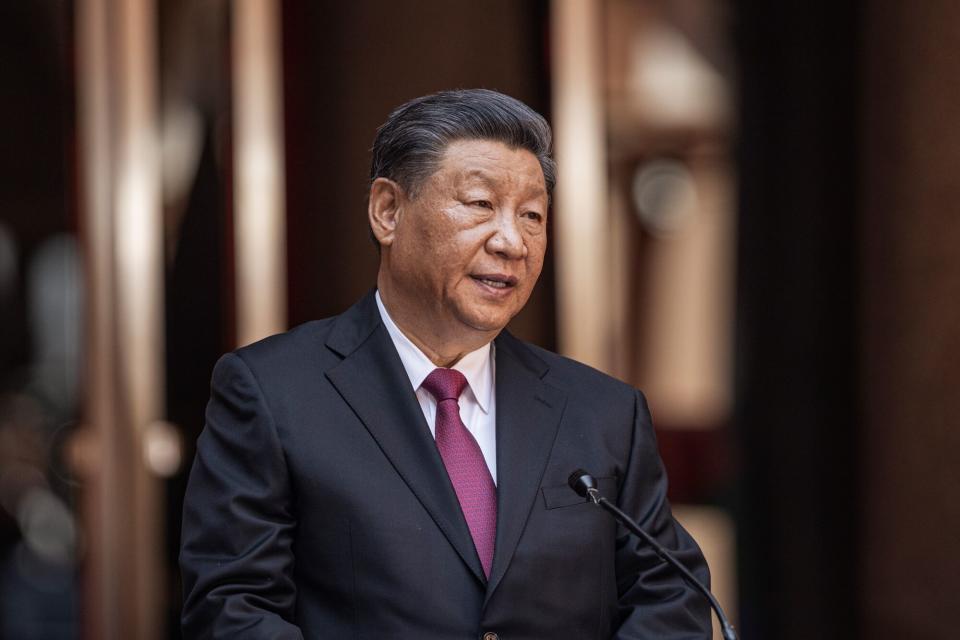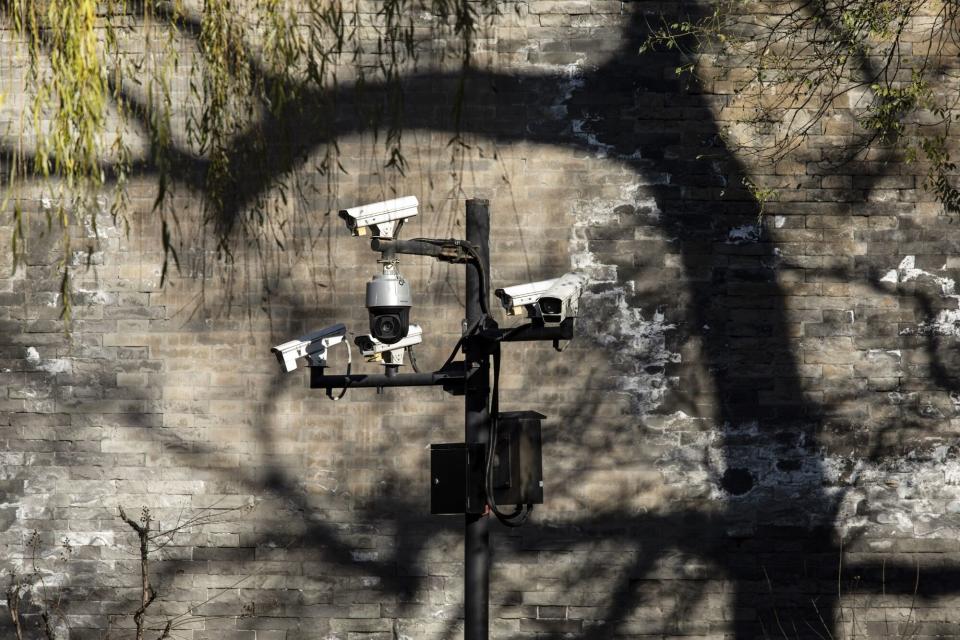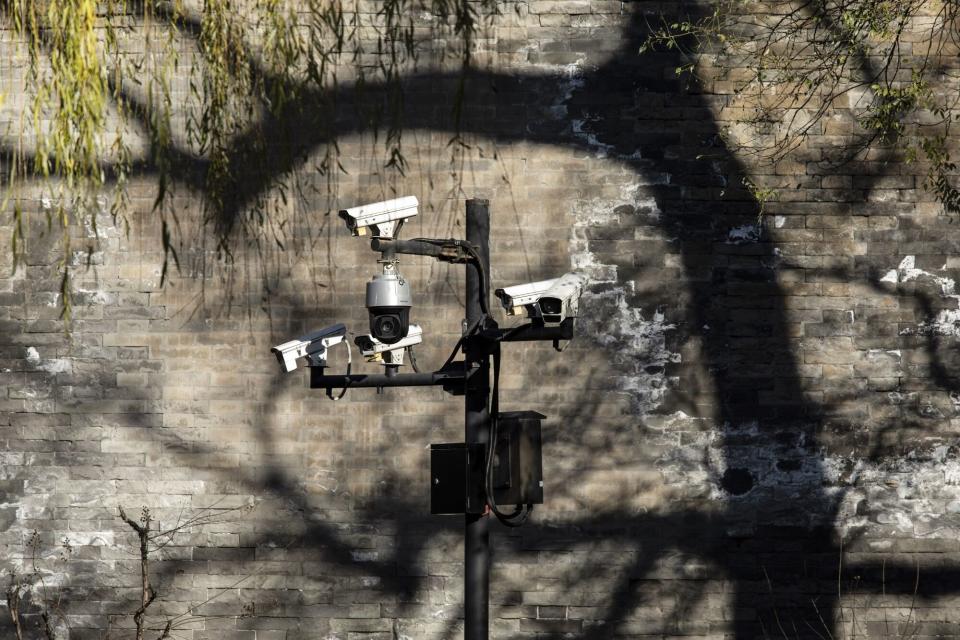Xi’s Security Obsession Turns Ordinary Citizens Into Spy Hunters
(Bloomberg) -- As students flooded back into Beijing’s top universities in early September, a propaganda blitz around campuses signaled an ominous addition to their syllabus: a crash course on how to catch spies.
Most Read from Bloomberg
India, Canada Trade Diplomatic Blows Over Murder Allegations
Vegas’ Newest Resort Is a $3.7 Billion Palace, 23 Years in the Making
How Auto Executives Misread the UAW Ahead of Historic Strike
At the government-run Tsinghua University videos were beamed onto faculty screens instructing teachers and students to become a “defense line” against foreign forces, while the Beijing University of Technology threw a national-security themed garden party, according to the nation’s spy agency.
Students at Beihang University, an aeronautics institute under US sanctions for its military links, were even asked to play an interactive training game, called Who’s The Spy? “In what special way will the college students around you reinvigorate national security?” the Ministry of State Security wrote on its new WeChat account.
As President Xi Jinping throws up a forcefield of security controls to repel perceived foreign threats to Communist Party rule, Beijing’s message to the public is spooks are everywhere — not just universities. Police in Henan province have urged citizens to quiz neighbors they mistrust on pop culture to ascertain their patriotism, while Shandong province state media published posters with the tagline “spies might be all around you.”
The push comes after Xi chaired a National Security Council meeting in May that stressed the importance of “extreme-case scenario” thinking — a phrase the ruling party had previously reserved for describing natural disaster preparedness. China has since passed a new anti-spy law, accused consulting firms of working for overseas intelligence agencies and warned that foreign forces are infiltrating the energy sector.
Perhaps Xi has good reason to unite the public around a common threat. China is locked in an ideological battle with the US that’s weighing on its economy, just as the Asian giant enters a slowdown that risks stoking another wave of social unrest. Last year, students led rare nationwide protests calling for the end of Covid Zero — and, in some cases, the removal of Xi.
“At the time of economic pressure, there are quite obvious concerns at the top leadership,” said Katja Drinhausen, head of the politics and society program at the Mercator Institute for China Studies in Berlin. “Using collective fear as a way to build political and social cohesion is a very dangerous game to play.”
Spy Agency
Since the Communist Party unified its intelligence arms to found the Ministry of State Security in the 1980s, the organization has stayed out of public sight. It’s the sole cabinet-level ministry without an official website and, until recently, its only public platforms were hot lines for reporting activities endangering national security.
That changed last month when the ministry joined China’s social media app WeChat. Since then, it’s posted almost every day on its efforts to secure national security, down to telling primary school students what photos they shouldn’t post on social media. On Friday, the MSS said preventing cyberattacks would “require the joint efforts of all of society.” That activity comes after CIA director William Burns said in July that the agency had made progress in rebuilding its spy network in China.
The MSS has since provided details of two cases of Chinese officials it has detained for providing information to the CIA — a rare move for an agency that does not provide data on its arrests. It has even delved into geopolitics, warning the US it must show “sincerity” for Xi to attend a huddle of the world’s top economic leaders in California in November, where he’s set to meet President Joe Biden for the first time this year.
“The rising visibility of the MSS appears part of an effort to normalize national security as a top priority in government policymaking, by encouraging it to adopt a public profile more like that of economic agencies,” said Neil Thomas, a fellow for Chinese politics at Asia Society Policy Institute’s Center for China Analysis.
The result is a growing level of mistrust among citizens in a nation where many still remember the effects of asking citizens to snitch on each other. Former leader Mao Zedong’s Cultural Revolution was a violent period when the public was encouraged to report the slightest hint that a friend, spouse or parent was linked to forces conspiring for the downfall of the Communist Party.
In July, one Chinese employee was allegedly reported to the police by his colleagues, after failing to remember the lyrics to a popular Chinese song at a karaoke night aroused their suspicion.
“He turned out to be a you-know-what,” one user who knew the group wrote on social media app Xiaohongshu, named after Mao’s Little Red Book that was used to compel the nation’s population to inform on each other. China offers up to 500,000 yuan ($68,160) to citizens who successfully report spies.
That post, which Bloomberg hasn’t been able to verify, garnered some 16,000 likes as users enthusiastically exchanged tips for spotting spies. Not knowing slang popularized by the annual spring gala broadcast or mnemonic devices taught in math class could all be hallmarks of a spook, they said.
Misplaced Suspicion
The push to root out spies risks targeting innocent people. In a now-deleted post on Xiaohongshu, one person apologized after a suspected foreign agent turned out to be a university student taking photos for their fieldwork research. The person didn’t respond to a Bloomberg request for comment.
A hyper-vigilance around spilling sensitive information is growing in the workplace. State-owned enterprises are running training sessions on state secrets, according to people familiar with the matter. More documents are being marked as state secrets, and can only be browsed at the office, said one of the people, who declined to be named due to fear of state reprisals.
The government has also launched an app to help Communist Party members and government employees bolster their knowledge and skills about secret-keeping.
The obsession with national security is fundamentally linked to protecting the Communist Party’s future. State Security Minister Chen Yixin in July wrote that national security was about political security. “The core of political security is regime security,” he added.
But that drive is also creating a deep suspicion of foreigners that runs counter to the party’s recently stated aim of wooing investors and reinvigorating the private sector. Foreigners are reporting it’s harder to meet with once-friendly officials, as the atmosphere of suspicion grows.
Sheena Greitens, associate professor at the LBJ School of Public Affairs at UT-Austin, said encouraging citizens to spy on each other would have “damaging consequences” for overall governance in China.
“It can lead to false reporting,” she said. “That can backfire for the internal security agencies themselves, because it means they are working from increasingly bad information.”
--With assistance from Philip Glamann.
(Updates with a recent social media post by the MSS.)
Most Read from Bloomberg Businessweek
©2023 Bloomberg L.P.

 Yahoo News
Yahoo News 



